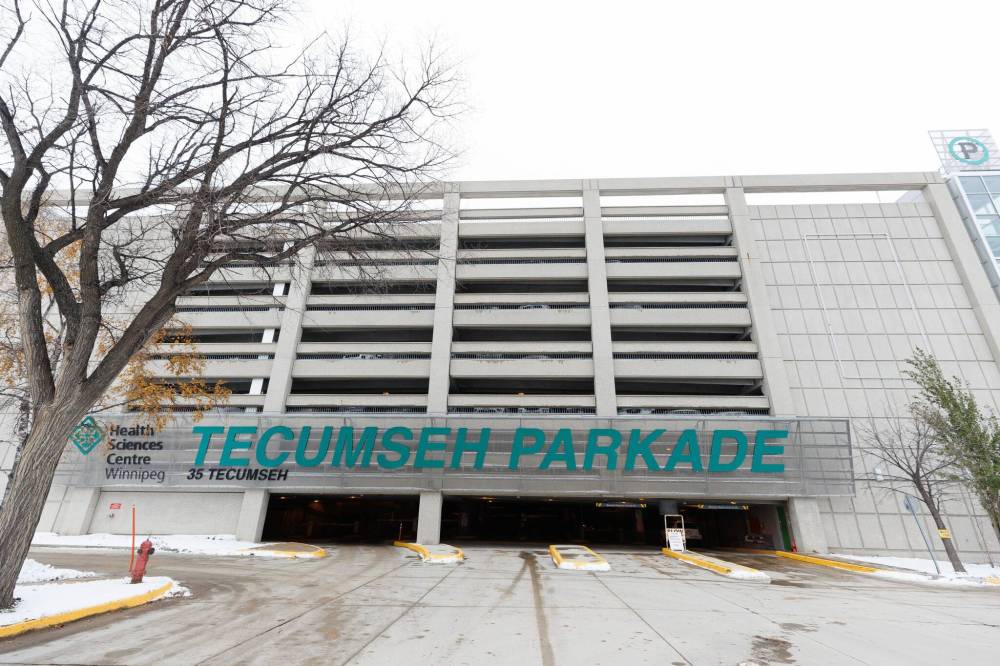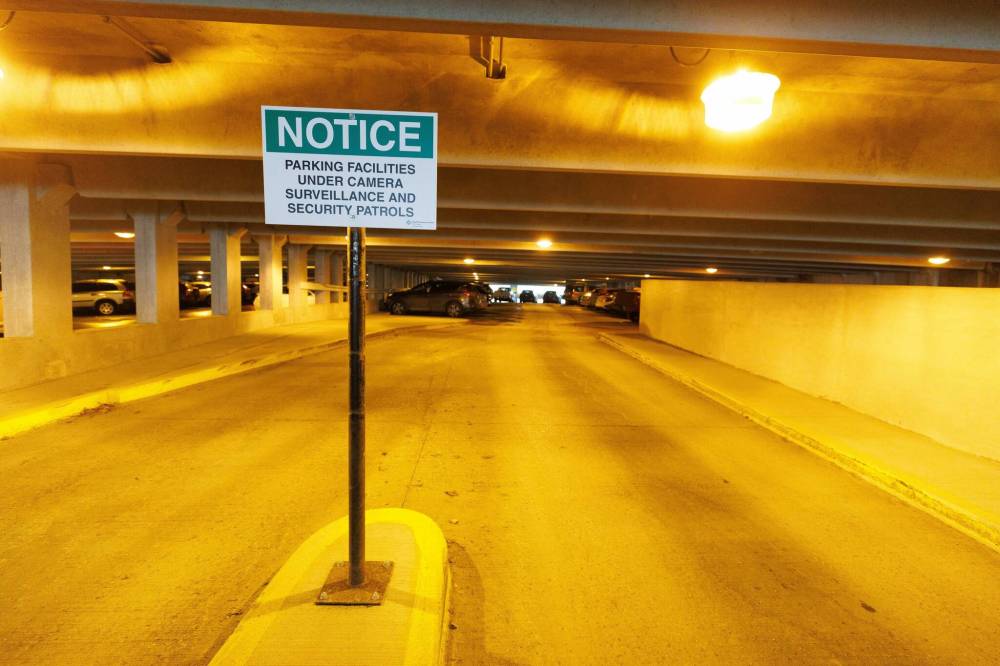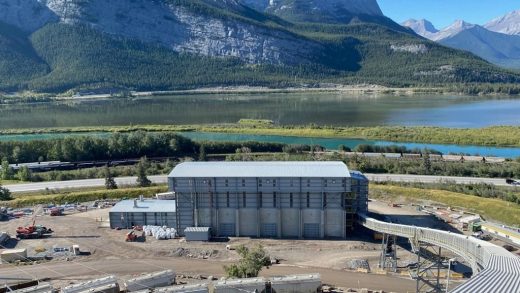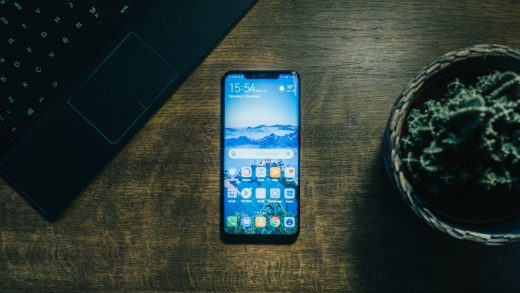
Dozens of nurses have stepped forward with accounts of violence, theft and security concerns on the Health Sciences Centre campus, just a day after their union asked members to share their experiences as it prepares for grievance hearings with the provincial health authority.
“It is not a safe environment, and you can only talk so much about it until you finally say, ‘We are done talking, and we need to take action here,’” Darlene Jackson, president of the Manitoba Nurses Union said Thursday.
“We feel it’s time they take this seriously.”
MIKE DEAL / WINNIPEG FREE PRESS
The Tecumseh parkade at 36 Tecumseh Street, near the Health Sciences Centre. The Manitoba Nurses Union has filed a grievance against Shared Health, citing safety concerns in parkades and surface parking lots surrounding HSC.
The union has filed a grievance against Shared Health, citing safety concerns in parkades and surface parking lots surrounding HSC, and an arbitration hearing is slated for early December.
A second grievance concerning how the health authority reports on incidents of violence provincewide has also been filed. A date has not been announced yet for that arbitration hearing.
The union said approximately 50 people have already responded to its open letter Wednesday asking members to describe safety-related incidents at Winnipeg’s largest hospital.
MIKAELA MACKENZIE / WINNIPEG FREE PRESS FILES
Darlene Jackson, president of the Manitoba Nurses Union: “We feel it’s time they take this seriously.”
The nurses have reported everything from vehicle thefts to physical assaults, including being punched and spit on.
Two nurses have been targeted in serious assaults in recent weeks, it said.
Jackson chided the health authority, saying in the last 18 months it has also been submitting less-detailed reports to the union after violent incidents. The lack of information prompted the union to file the second grievance, calling on Shared Health to improve its reporting processes at all facilities.
“We are absolutely unable to support our members any longer because the reports of violence we are getting from our employer have no information that we can actually use,” she said. “A report may say, ‘nurse struck in face,’ well, at the Health Sciences Centre, there are 3,000 nurses — how would you ever track that nurse down?”
The grievances were the only remaining avenue to have safety concerns addressed, after years of complaints from nurses, union leaders and provincial officials calling on Shared Health to intervene, Jackson said.
The area immediately surrounding HSC is among the most dangerous in Winnipeg, logging 181 violent crimes and 492 property crimes between July 2022 and July 2023. Only the Spence, Central Park and South Point Douglas neighbourhoods logged more violence in the last year, WPS data shows.
The HSC-area numbers represent a 38 per cent and 83 per cent rise, respectively, in such crimes, compared with last year’s totals. Property crimes in the area have increased by nearly 100 per cent since 2019, while violent crimes have risen by about 12 per cent, the same data shows.
“It is not a safe environment, and you can only talk so much about it until you finally say, ‘We are done talking, and we need to take action here.’”–Darlene Jackson
“We have provided those crime stats to the employers on several occasions, but it doesn’t seem to be resonating,” Jackson said. “We’re hoping the arbitrator agrees that (safety) is an employer responsibility.”
Shared Health has taken several measures to reduce property damage since last spring, including increasing security patrols, adding additional lighting, enhancing video surveillance and discouraging people from loitering in stairwells. The efforts have resulted in an approximately 80 per cent decrease in reported parkade incidents, when comparing the month of May to September, it said in a statement.
The Free Press visited HSC parkades on Tecumseh Street, William Avenue and Emily Street Thursday — all three buildings were largely clean, with stairwells cleared of debris, secured with fencing and cleaned of graffiti.
MIKE DEAL / WINNIPEG FREE PRESS
A sign at the entrance of the Tecumseh parkade lets people know that video surveillance is being used in the structure.
“The safety and security of all patients, staff and visitors is of paramount importance to everyone working in the health-care system, including HSC leadership,” a spokesperson said via email.
“We will continue to speak with union leadership in the hopes of amicably resolving this grievance and taking the necessary steps to ensure staff feel safe and supported from the time they arrive on campus to when they leave.”
Jennifer Dunsford, a University of Manitoba researcher specializing in workplace violence against nurses and director of clinical education at the College of Nursing, warned if staff safety is not swiftly and thoroughly addressed, it could lead to more people leaving the profession.
As part of her PhD dissertation, the RN interviewed more than three dozen nurses across Canada who were victims of workplace violence. Nearly all reported they had considered leaving the profession after feeling their concerns went unheard by their superiors.
“It’s hard to hear nurses who… could continue to make contributions the the health-care system say the circumstances are not such that they feel it is not physically or psychologically safe to continue working,” she said. “It’s almost like a vicious cycle. The violence is bad because there aren’t enough people to meet the needs of the patients, and there aren’t enough people because the violence is bad.”
She noted the union’s grievance play might be a last-ditch effort to raise awareness on an issue that is commonly overlooked.
“When it gets to the point where there are grievances… it’s got to be really bad, because I found nurses’ work ethic is such that they will continue practising, even when they could be hurt, themselves.”–Jennifer Dunsford
“When it gets to the point where there are grievances… it’s got to be really bad, because I found nurses’ work ethic is such that they will continue practising, even when they could be hurt, themselves.”
New Health Minister Uzoma Asagwara has been hearing about safety complaints at HSC for several months, and has assured health-care workers their concerns are being heard.
“I’ve already met with system leaders, I’ve heard from health-care workers and we are actively working on taking steps to address this,” Asagwara told the Free Press. “This is a top priority. Health-care workers anywhere, and everywhere, deserve to be safe at work.”
Tyler Searle
Reporter
Tyler Searle is a multimedia producer who writes for the Free Press’ city desk. Since joining the paper in 2022, he has found himself driving through blizzards, documenting protests and scouring the undersides of bridges for potential stories.
Read full biography


